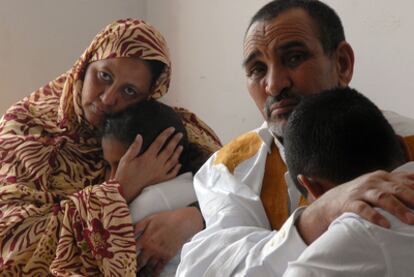Mauritania "may free" rape family
Clan members convicted of forcing marriage and sexual assault to be repatriated
The Mauritanian family that was the subject of an exemplary sentence in Spain for enforcing marriage upon a 14-year-old girl, leading to her being raped, will be taken back to their native country by Interpol agents this week to complete their jail terms.
Hawa Mint Cheikh, the girl's mother, and her nephew, Mokhtar Salem, will be transferred from the Madrid prisons of Soto del Real and Valdemoro, respectively, and handed over to Mauritanian police at Barajas airport, in theory to complete their sentences in Nouakchott. Hawa was sentenced to 12 years by the Supreme Court in March and her husband, Mohamed Ould Abdallahi, received two and half years for abuse and threatening behavior.
Mokhtar, 45, was handed a 12-year term for raping his cousin, Selamha Mint Mohamed, in Spain in 2007 when she was 14 years old. Hawa was found guilty of sexual assault for collaborating in the girl's rape. The decision to repatriate them to Mauritania is covered by a bilateral extradition agreement signed between the West African nation and Spain in 2006.
Abdallahi, who is at liberty after serving part of his sentence at the El Puerto III prison in Cádiz, is also expected to return to Mauritania with two of his children. Selamha will remain with a foster family in Puerto Real, Cádiz, where she has lived since she was raped.
As well as the penal sentence, Selamha's parents were given a 26-year restraining order and Mokhtar a 10-year ban from going near the girl.
The story began in 2006 when Hawa and Selamha took a vacation in Guerou, 500 kilometers southeast of the capital Nouakchott. While there, Selamha's cousin, Mokhtar Salem, asked for her hand in marriage and her father, Abdallahi, consented by telephone after a dowry was offered. The marriage took place in Mauritania and after a few weeks of cohabitation Selamha returned to Puerto Real with her mother to continue her studies.
In May, 2007 Mokhtar arrived in Cádiz and continued to maintain sexual relations with Selamha. Her mother pressured her into complying by "hitting her, biting one of her breasts and threatening to beat her with a television cable," according to the sentence.
"I resisted, but my parents said they would kill me, that they would burn me or cut my throat," said Selamha via a videoconference at the Provincial High Court trial. Selamha's father was not present in the house that day, the court heard.
The case has caused tension between Spain and Mauritania, which lies 300 kilometers from the Canary Islands, and a deluge of protests has emanated from the African state.
"It's probable that the family will be released when they arrive in Mauritania," says Alakhbar, a private press agency in Mauritania. Other sources suspect that they will spend a few days behind bars before being released on health grounds.
The imams in Mauritania, led by the chief cleric of the Great Mosque in Nouakchott, along with a number of politicians had asked Spain for "clemency" over a wedding that, in their eyes, is legal. Justice Minister Abidin Ould Kheir petitioned Spain in May 2010 to allow Mokhtar and Hawa to complete their sentences in Mauritania.
Two months later Kheir received a positive response but the transfer has taken 14 months to be pushed through.
"Our society sometimes behaves in a hypocritical manner," said the lawyer of the Mauritanian family, José Álvarez. "It does not respect that a foreign minor, living in Spain, is legally wed in her native country while in ours some minors have abortions with complete liberty and without giving explanations."

Tu suscripción se está usando en otro dispositivo
¿Quieres añadir otro usuario a tu suscripción?
Si continúas leyendo en este dispositivo, no se podrá leer en el otro.
FlechaTu suscripción se está usando en otro dispositivo y solo puedes acceder a EL PAÍS desde un dispositivo a la vez.
Si quieres compartir tu cuenta, cambia tu suscripción a la modalidad Premium, así podrás añadir otro usuario. Cada uno accederá con su propia cuenta de email, lo que os permitirá personalizar vuestra experiencia en EL PAÍS.
¿Tienes una suscripción de empresa? Accede aquí para contratar más cuentas.
En el caso de no saber quién está usando tu cuenta, te recomendamos cambiar tu contraseña aquí.
Si decides continuar compartiendo tu cuenta, este mensaje se mostrará en tu dispositivo y en el de la otra persona que está usando tu cuenta de forma indefinida, afectando a tu experiencia de lectura. Puedes consultar aquí los términos y condiciones de la suscripción digital.








































